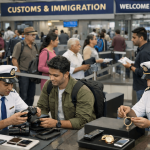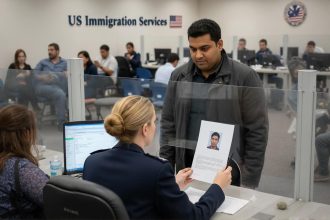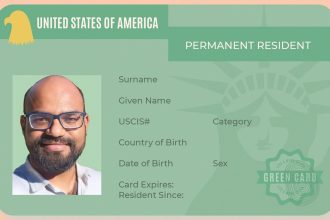Re-entry to the United States is challenging these days even for legal immigrants, amid President Trump’s immigration crackdown at ports of entry across the country. Green Card holders, who are lawful permanent residents in the US, are not exempt to the scrutiny that the CBP officers have intensified to assess the immigrant status and re-admissibility of foreign nationals (aliens) returning from their home countries or a trip abroad. Precisely, the Trump administration’s no-compromise efforts to fix loopholes in immigration and security has become a gnawing concern for legal immigrants too.
Elderly Indians among Green Card holders, who are flying back to USA after a winter trip to India, are in for an unprecedented surprise on arrival, as the CBP officers are interrogating them and inspecting their documents. Some cases have been reported wherein senior citizens faced intense pressure to sign Form I-407 to voluntarily surrender their Green Cards on arrival at US airports, according to immigration attorneys.

Some elderly Green Card holders spend winter months in India as they are not yet accustomed to bone-rattling winters in America. They are among the targets of ‘Green Card abandonment’. The US Immigration and Nationality Act (INA) states that those who spend more than 365 days in a calendar year outside the US are subject to ‘Green Card abandonment.’ At the same time, they can exercise their right to challenge this in court.
What is more worrisome is that a period of 180 days outside the US, even a shorter absence, has become a premise for the CBP officers to heavily scrutinize Green Card holders, senior citizens in particular.
What are the rights of Green Card holders at the US ports of entry in the above scenario? Immigration attorneys are receiving such queries every day. “Generally, an individual’s Green Card cannot be revoked at the port of entry unless he/she voluntarily signs Form I-407 to surrender it,” Kripa Upadhyay, an immigration attorney in Seattle, was quoted saying in an article by The Economic Times. “Only an immigration judge can take away a Green Card, so individuals should not sign Form I-407,” said another Indian-origin attorney in the US.
Mostly, Green Card holders’ absence from the US for 180 days or more in a calendar year, and their failure to maintain strong ties to the US are triggering CBP officers who have legal rights to inspect and interrogate immigrants returning from their home countries. At the same time, Green Card holders reserve the right to a hearing before an immigration judge if there are attempts to revoke their lawful permanent residence status, like secondary inspections, legal notices, unjust detention on arrival, and threats of deportation. A lawyer can be hired to represent their case during a court hearing.
Immigration attorneys caution Green Card holders against making frequent travel and spending more than 180 days outside the US in a year. If an individual has history of secondary inspections, he/she may come under the CBP scanner on return from overseas travel. It is recommended that Green Card holders maintain tangible evidence of their strong ties to the US, like employment, family, property, or filing tax returns during their overseas stay for months. They can show the evidence during a routine inspection or additional scrutiny by the US Customs officers.
As part of the immigration law enforcement by President Trump, Green Card holders must have a re-entry permit for re-admission to the USA after spending 365 days or more abroad. In view of this, immigration attorneys advise Green Card holders to apply for a re-entry permit before flying out of the US for a year. CBP officers have the right to deny re-admission to you for not having a re-entry permit. In short, you should carefully plan a long absence from the US soil to maintain your LPR status.
Immigration attorneys advise Green Card holders to cooperate with the CBP officers if their electronic devices, luggage, and/or social media accounts are examined. The US Customs officer may not need a warrant to check your devices and luggage for prohibited items, documents, or anti-US sentiments that could impact your re-entry to the country after a period of stay abroad. Everything from your belongings to travel history and social media communications is under the CBP scanner these days.









Is green card holder at risk even if they have approved re-entry permit with them?
Hi Piyush! Having a re-entry permit would mitigate risks for a Green Card holder. However, Green Card holders flying back to the US after a period of stay abroad are subject to routine inspections and interrogation on arrival.
Travel to India in aug 2024 but could not return in under 180-days due to health issues (arthritis, COPD). Aged 70 years. What documents to carry to not face any issues coming back to US? Also green card expires in Sept 2025. Please suggest
Hello Sir! In our opinion, you should carry your medical reports and valid health insurance while traveling back to the US. It is recommended that you consult an immigration attorney for proper guidance.
Have you heard anything about what green card holders with global entry are experiencing when they reenter the US? Any additional scrutiny compared to previous years?